
Olga Benetti. Italian postcard by Ed. Soc. Anon. It. Bettini, Roma, no. 206.
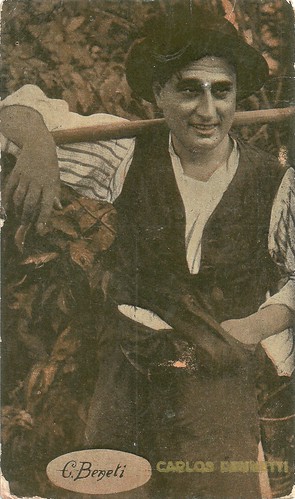
Carlo Benetti. Spanish collectors card by Amatller Marca Luna, Series no. 1. Photo: Principales Artistas Cinematograficos. On the front of the card, Benetti is misspelled as 'C. Beneti' and at the back of the card, the actor's name is spelled as 'Carlos Bennetti' (sic).
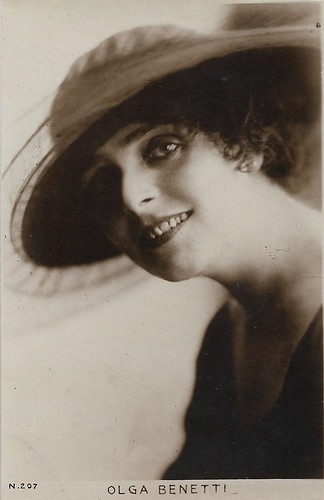
Italian postcard, no. 207. Photo: Bettini.
They immediately got the leads in six films
Carlo Benetti was born in Florence in 1885. Olga Benetti was born on an unknown date in Ceprano (Frosinone). They were married before they entered the film business.
Both debuted in 1912 at the Cines company with two short comedies, E' meglio l'arte/Because of a Widow (N.N., 1912) and In campagna è un'altra cosa/Their Country Relations (N.N., 1912).
In 1913, they were hired by the Latium film company. They immediately got the leads in six films: La finestra illuminata/The Light in the Window (1913), Passa una donna!/Stella Lescaut (1913), La mano della scimmia/The Strange Theft (1913), Verso l'amore/Towards love (1913), and L'orrida meta/The horrid goal (1913). All were directed by Ubaldo Pittei.
The engagement with Latium didn't last long, though. In September 1913 they started to work for the joint companies Cines and Celio. Together they were the protagonists in the drama Un divorzio/A divorce (1914). They also worked as supporting actors.
Olga played opposite Leda Gys and Alberto Collo in the Cines drama Amore bendato/Love Is Blind (1914), and both in Il club delle maschere/The Ghost Club (Mario Ghione, 1913), starring Mario Bonnard. Other titles were e.g. L'oro maledetto/The Lure of Gold (Ivo Illuminati, 1914) for Celio and La parola che uccide/The word that kills (Augusto Genina, 1914) for Cines.

Italian postcard by Magazine Film - corriere dei cinematografici, Napoli/Roma. Photo: Poseo & Co., Napoli.
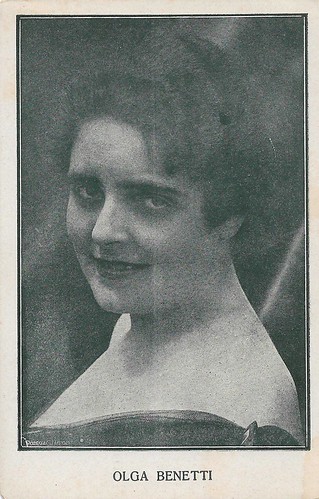
Italian postcard by Magazine Film - corriere dei cinematografici, Napoli/Roma. Photo: Poseo & Co., Napoli / Caesar Film.

Spanish collectors card by Chocolat Imperiale, no. 10. Photo: Pinto, Roma / Caesar Film. Guido Trento and Olga Benetti in Frou-Frou (Alfredo De Antoni, 1918), adapted from the play by Meilhac and Halevy.
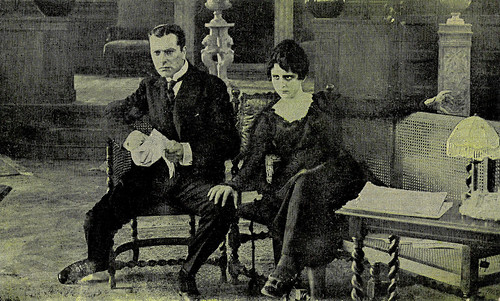
Spanish postcard by Amattler Marca Luna chocolate, series 7, no. 13. Livio Pavanelli and Olga Benetti have just heard they will probably not inherit the throne in Carnevalesca (Amleto Palermi 1918), after Lucio d'Ambra. Photography was by Giovanni Grimaldi.
The bond with Francesca Bertini
At the end of 1914, the Benetti couple moved to the Caesar company, where Olga had leads in films by Emilio Ghione such as L'ultimo dovere/The ultimate duty (Emilio Ghione, 1915), and Per la sua pace/For his peace (Emilio Ghione, 1915). However, equally important were Olga Benetti's roles as an antagonist in the Francesca Bertini dramas, starting with Benetti's first feature-length film, Nelly la Gigolette/Nelly the gigolette (Emilio Ghione, 1915). The bond would last for years, with memorable such titles as La signora delle camelie (Gustavo Serena, 1915), Odette (Giuseppe de Liguoro, 1916), Fedora (Giuseppe de Liguoro, Gustavo Serena, 1916), Andreina (Gustavo Serena, 1917), La piccola fonte/The small source (Roberto Roberti, 1917), and Tosca (Alfredo De Antoni, 1918).
In 1918, she also played Clorinda opposite Amleto Novelli and Edy Darclea in the historical epic La Gerusalemme liberata/Jerusalem Liberated (Enrico Guazzoni, 1918), based on an epic poem by Torquato Tasso from 1581. Carlo often co-acted in these films too, such as in Nelly la Gigolette and Odette. In 1915 Carlo played without his wife as Don Federigo opposite Francesca Bertini in the latter's classical 'verist' drama Assunta Spina (Francesca Bertini, Gustavo Serena, 1915). Without Olga, he also played with Bertini in Il capestro degli Asburgo/The halter of the Habsburgs (Gustavo Serena, 1915), Ivonne, la bella danzatrice/Ivonne, the beautiful dancer (Gustavo Serena, 1915), Diana, l'affascinatrice/Diana the Seductress (Gustavo Serena, 1915), La perla del cinema/The pearl of cinema (Giuseppe de Liguoro, 1916), and Lacrymae rerum/Tears (Giuseppe de Liguoro, 1916).
In the mid-1910s the Benetti's were highly productive regulars of the Caesar troupe and thus also appeared in several films by Gustavo Serena, Emilio Ghione, Camillo De Riso, and Edoardo Bencivenga - often performing in the leads or most important antagonists. By 1918 the golden years at Caesar were over. The couple moved to Filmograf, where they acted in films by Gian Orlando Vassallo and Gustavo Serena. Between 1920 and 1924 the couple acted in films at Rinascimento Film and FERT in Turin and at Libertas in Rome.
Carlo played in several films with Maria Jacobini and directed by Gennaro Righelli: La casa di vetro/The glass house (1920), Il richiamo/The recall (1921), Il viaggio/The Trip (1921), and Cainà/Cainà: The Island and the Continent (1922). He also played opposite Jacobini in Guglielmo Zorzi's La bocca chiusa/The closed mouth (1924). He also acted with Italia Almirante Manzini in La grande passion/The great passione (Mario Almirante, 1922), with Helena Makowska in La dama e il mistero/The Lady and the Mystery (Amleto Palermi, 1921), and with Rina De Liguoro in Maremma (Salvatore Aversano, 1924).
La vergine del faro/The virgin of the lighthouse (Telemaco Ruggeri, 1924) was Olga's last film. In the later 1920s Carlo could still be seen in such films as Fra Diavolo (Mario Gargiulo, Roberto Roberti, 1925), Kiff Tebby (Mario Camerini, 1928), and La locandiera/The innkeeper (Telemaco Ruggeri, 1929). Carlo Benetti died in 1949 in Rome, Lazio, Italy. His wife had passed away a year earlier, in 1948.

Italian postcard, no. 317. Photo Civirani, Rome.
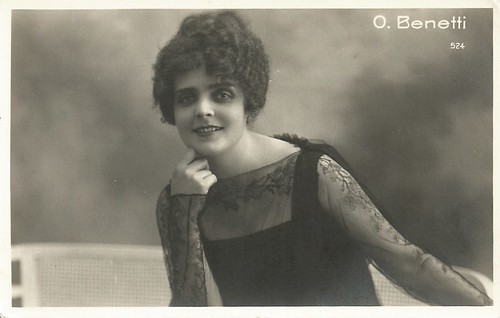
Italian postcard by Ed. Vettori, Bologna, no. 524.

Italian postcard by Ed. Soc. Anon. It. Bettini, Roma, no. 165.

Italian postcard by Ed. G. Vettori, Bologna, no. 505. Photo: Pinto, Roma.
Sources: Aldo Bernardini (Cinema muto italiano. Protagonisti - Italian), Aldo Bernardini/Vittorio Martinelli (Il cinema muto italiano, 1912-1929), and IMDb.
NB. IMDb erroneously claims Olga was also in the 1911 version of Gerusalemme liberata/The Crusaders (Enrico Guazzoni, 1911). Prints of Verso l’amore, Amore bendato, and a fragment of Fedora can be found in the collection of the Eye Filmmuseum in Amsterdam.
This post was last updated on 30 April 2023.
No comments:
Post a Comment